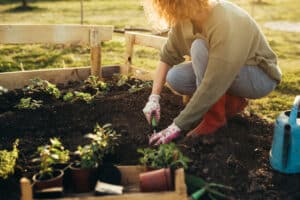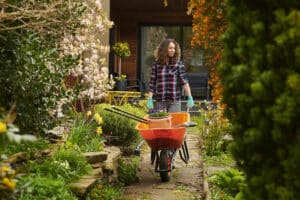 ☰ Menu
☰ Menu
Spring is the start of gardening season. It can be exciting to get back into your yard for the first time since before the winter. For many people, gardening is a great outlet – it can be an excellent source of outdoor physical activity and provide you with a highly enjoyable and fulfilling way to improve the appearance of your house.
The first few times out working in the yard each spring create an increased risk of injury. There is often a great deal of spring maintenance work to be done to get your garden ready for summer. In addition, working in the garden will engage and place stress on muscles and joints which may not have been used in serval months. For these reasons, it should come as no surprise that over 300,000 people sustain gardening injuries each year.
While some gardening injuries are caused by an accident, many occur gradually over time and may not develop symptoms until they become more serious. Below, we’ll discuss some of the most common gardening injuries as well as some steps you can take to minimize your risk of getting hurt while doing yard work this spring.
Gardening often requires you to perform the same task over and over again for hours at a time. Whether you’re using pruning shears, lifting heavy bags of soil or mulch, or performing routine digging, raking and weeding tasks, these repetitive motions can result in a variety of muscle strain and tendinitis injuries. Gardeners most commonly experience these injuries in their:
Gardening requires a lot of bending, squatting, kneeling and heavy lifting. Often, these actions may be performed for an extended period of time, especially if you work in the yard for large portions of the day. If you’re not careful, these motions can cause you to twist your body into awkward positions, resulting in a variety of back injuries. This is especially common at the start of gardening season when you are just getting back into these activities after a long winter break.
In addition, overhead activities associated with cutting down high branches can potentially irritate your neck, causing an injury.

The most common gardening knee injury is prepatellar (kneecap) bursitis, an inflammation of the fluid-filled (bursa) sac in the front of your kneecap. The bursa sac helps your knee move freely when you straighten or bend your knee. This inflammation can be painful and limit your mobility.
Slips and falls cause approximately 115,000 gardening injuries each year, making them the most common cause of gardening injuries. Yard work provides ample opportunities for slip and fall accidents. It’s easy to trip on rakes, hoses and other tools left out on the ground. It’s also common for people to fall down sloped ground, slip on steps, trip over potted plants or fall off a ladder.
Slip and fall accidents can result in a variety of serious injuries, including:
Power tools such as lawnmowers and hedge trimmers result in some of the most serious gardening injuries. These injuries most commonly occur when power tools aren’t properly maintained. However, it’s also common to suffer an injury when using a manual garden tool such as shears, pruners and secateurs.
These injuries can often result in cuts and lacerations. When power tools aren’t properly maintained, you may suffer a muscle injury from having to strain more, or you may get injured if a piece breaks off the machine and ricochets towards you.
While it’s impossible to entirely eliminate the risk of gardening injuries, there are steps you can take to minimize the likelihood of getting hurt as you begin your spring yard work:

Accidents and injuries still happen on occasion, even if you take all the proper precautions to avoid them. If you suffer a gardening injury, Colorado Advanced Orthopedics can help you restore a pain free life.
Our team of board-certified, fellowship trained orthopedic surgeons possess a wide range of specializations and can address just about any gardening injury you may have. Our team is committed to delivering the best care along the Western Slope, and our surgeons regularly achieve outcomes that exceed industry standards.
For injuries that don’t require surgery, our in-house physical therapy team can provide you with more conservative treatment options that will help eliminate pain and restore full function to the injured region.
Contact us today to schedule an appointment. Colorado Advanced Orthopedics serves patients in Meeker and throughout the White River Valley.
Subscribe to our monthly publication highlighting Life's Joy and getting back to your life. We feature health tips, being out and about, and bringing joy to daily life.
Subscribe